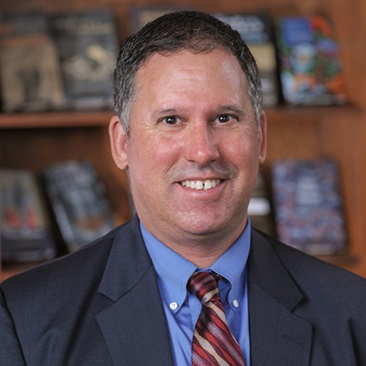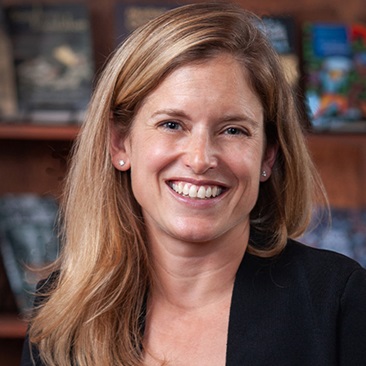
At Maxwell, the Conversation About Citizenship Gains Fresh Perspective
October 11, 2024
A new collection of portraits from “Americans Who Tell the Truth” take their place in the Maxwell Foyer.
For nearly a century, in the north entrance to the Maxwell School of Citizenship and Public Affairs, a lone statue of President George Washington greeted all who entered the school. A former farmer, land surveyor, American Revolutionary War hero and first president who presided over the Constitutional Convention, his presence stood as an important reminder of the duties and responsibilities of Maxwell students as citizens.
Two years ago, other voices and individuals joined the first president in the building foyer with the installment of a collection of portraits from Robert Shetterly’s “Americans Who Tell the Truth” series, part of the Maxwell School’s wide-ranging effort to make its physical space more representative of its diverse community. Now in its second installment, the exhibition of portraits flanking the famous founder—titled “A Conversation with George Washington”— is designed to further contemplation and discussion around the topic of citizenship.

Some might be surprised to see contrasting figures like gold-medal Olympian and world heavyweight boxing champion Muhammad Ali, who was stripped of his titles and sentenced to five years in prison for refusing to serve in the Vietnam War, amid his fight for civil rights for Black Americans. “We wanted to get viewers to want to learn more about how and why someone like Muhammad Ali has something to say about citizenship,” says historian Gladys McCormick, who spearheads the effort as the school’s associate dean for diversity, equity and inclusion.
The surprise is intentional, but not intended to be confrontational. According to the artist’s website, “The portraits are the opposite of hot takes or quick opinions. They invite you to ponder a person, their words, the issues that inspire their life’s journey, work, activism and imagination. And then they welcome you into that vital conversation—across time and space—about what it means to be an American citizen.”
The update also includes portraits of famous and lesser-known activists working in the areas of disability rights, environmental sustainability, rural issues and voting rights, among others.
“The latest batch of portraits emerged out of ones the school considered from the first iteration of the collection,” says Stephanie Williams, who works alongside McCormick as the school’s strategic initiatives specialist for diversity, equity and inclusion. “We wanted to include folks who represented issues we felt were important to members of our community.”
“We also always have two portraits that put accountability on the table, in this case from the military for veterans and from an investigative journalist,” adds McCormick, referring to Paul Chappell and Ida Tarbell, respectively.
McCormick and Williams are in discussions with Maxwell colleagues to organize a series of events that relate to the new installation. On Oct. 8, Professor Tina Nabatchi, director of the Program for the Advancement of Research on Conflict and Collaboration, led a workshop on “Civic Skills for Civic Life” that modeled the objectives of the Conversation with Washington. In the spring they will host additional workshops guiding conversations around challenging topics like equity and responsibility.

In addition to Muhammad Ali, the second collection includes:
Ady Barkan Diagnosed with ALS in 2016, Barkan shifted his activism from economic and labor reform to America’s health care system; he spent the last seven years of his life advocating for “Medicare for All.”
Wendell Berry A prolific writer, Berry raises awareness of the destructive effects of large factory farming on rural communities, among other issues. A fifth generation Kentucky farmer, he cultivates his land with horses and organic methods of fertilization.
Paul Chappell After leaving active duty, the former Army captain became focused on the idea that society should train individuals to wage peace like they train soldiers for war. He has authored six books and is founder of the Peace Literacy Institute.
Shirley Chisholm As the first Black woman in Congress, “Fighting Shirley” introduced more than 50 pieces of legislation and fought for racial, gender and economic equality. She was the first Black woman to seek the Democratic nomination for president, winning 28 delegates despite being barred from televised debates.
Robin Wall Kimmerer A biologist and member of the Citizen Potawatomi Nation, Kimmerer blends science and Indigenous wisdom to advocate for a deeper relationship to the land and legal recognition of Rights of Nature. A Distinguished Teaching Professor at the State University of New York’s College of Environmental Science and Forestry, she works with the Haudenosaunee people of Central New York on land rights actions and restoration.
Alice Paul A chief strategist of the campaign for the 19th Amendment granting women the right to vote, Paul employed “deeds not words,” like pickets and hunger strikes, to promote federal reform. Subjected to arrests, beatings and forced feedings, she and other members of the National Women’s Party continued to fight until its passage.
Elizabeth Cady Stanton Stanton helped organize the first U.S. women’s rights convention in Seneca Falls, New York; drafted the women’s bill of rights; and championed women’s suffrage. She also worked to reform laws governing marriage and property, as well as education and religious issues.
Ida Tarbell Among many influential works, Tarbell’s 19-part series for McClure’s “The History of the Standard Oil Company,” an expose on how the business monopoly exploited the public, is known as one of the 20th century’s most important works of journalism.
Emma Tenayuca Tenayuca became a vocal advocate for Mexican-American and other workers in her home state of Texas at age 16. Blacklisted following the largest riot in San Antonio’s history, Tenayuca left the state, returning 20 years later as a teacher for migrants.
By Jessica Smith
Published in the Fall 2024 issue of the Maxwell Perspective
Related News
School News

Apr 2, 2025
Commentary

Mar 26, 2025
Commentary

Mar 24, 2025
